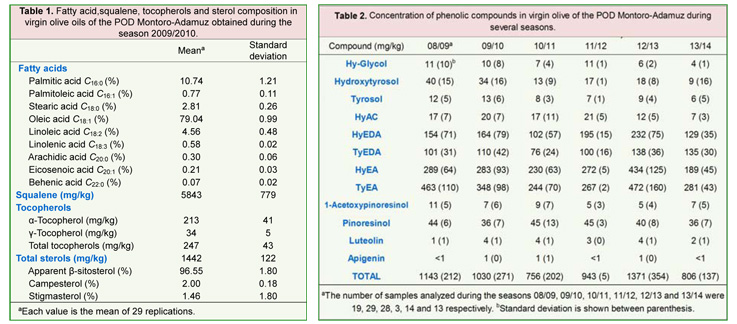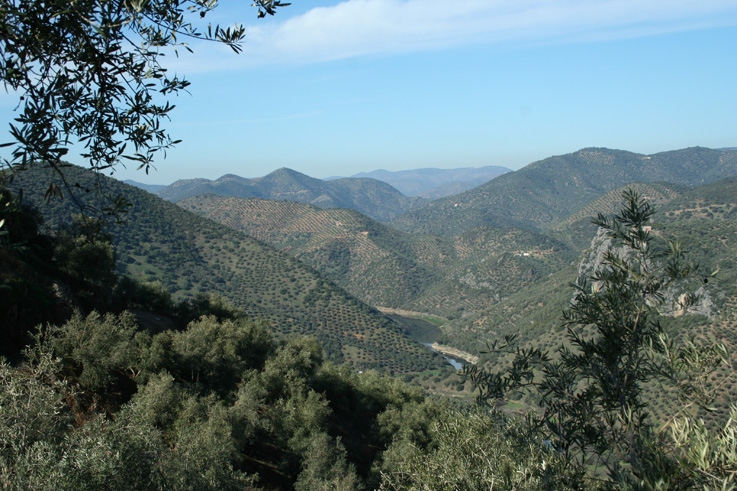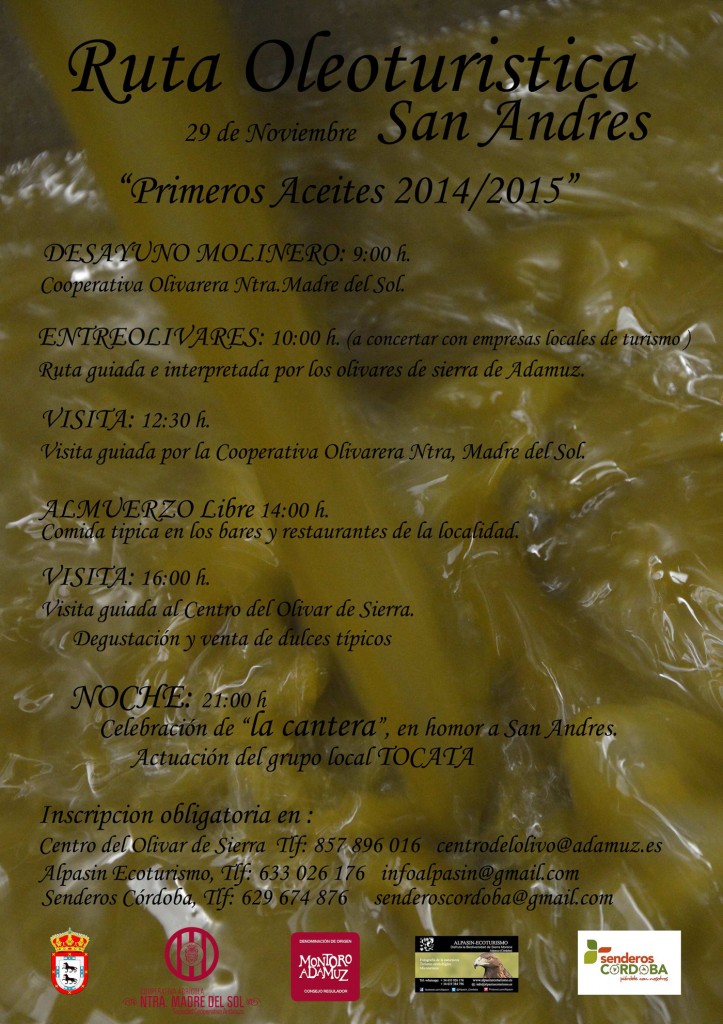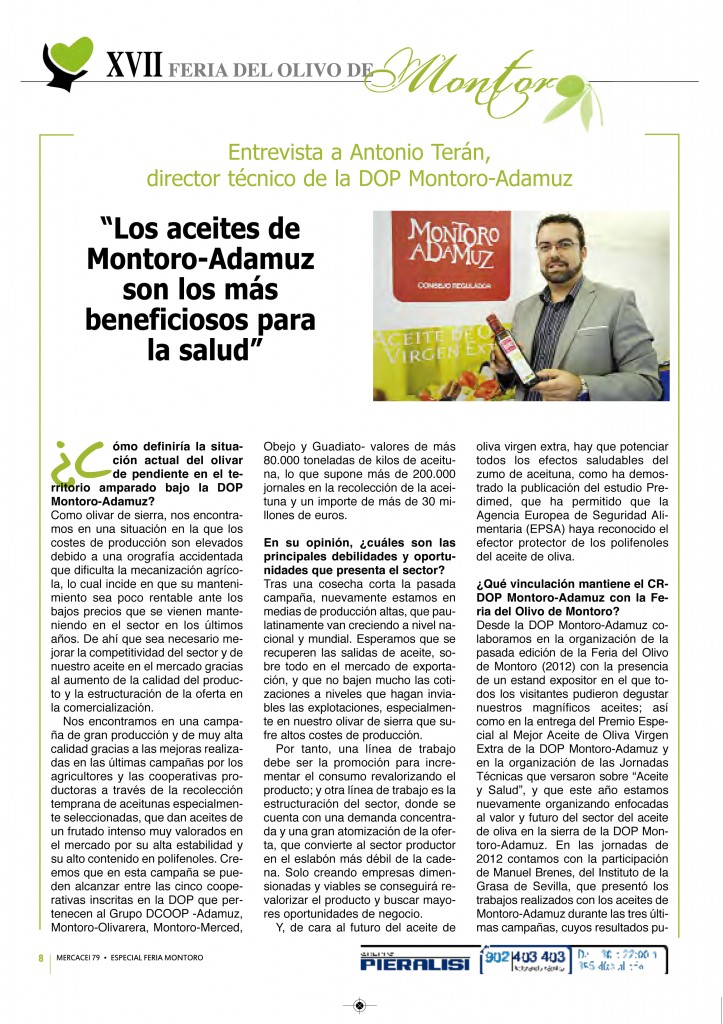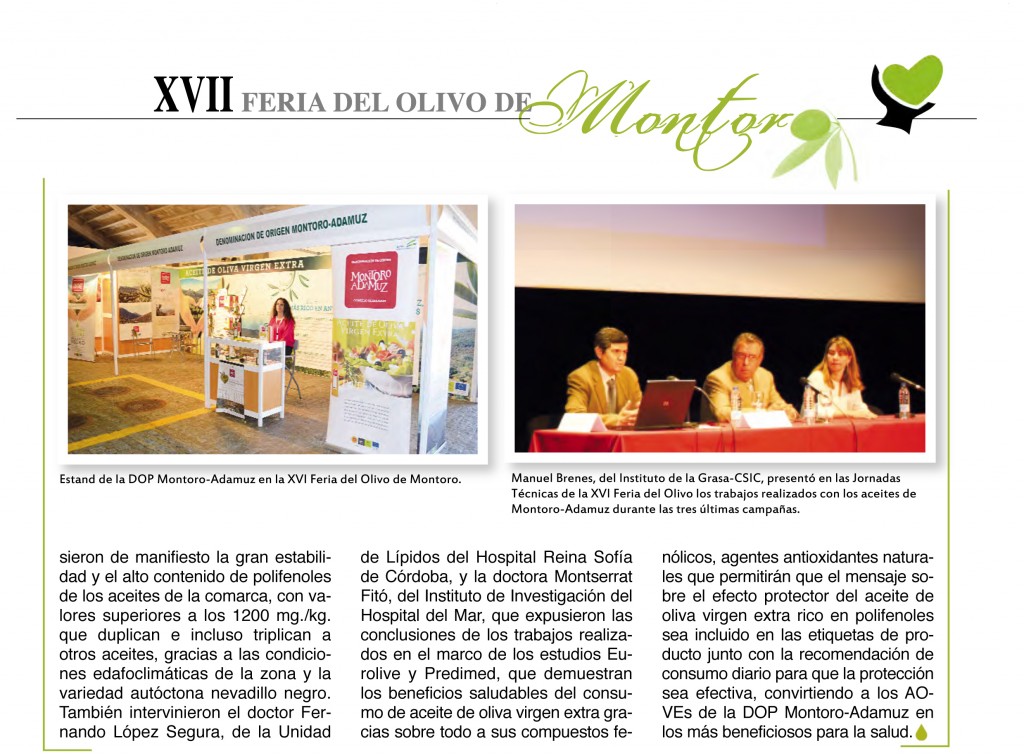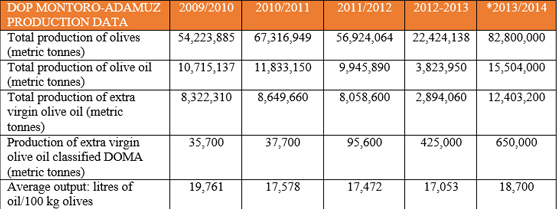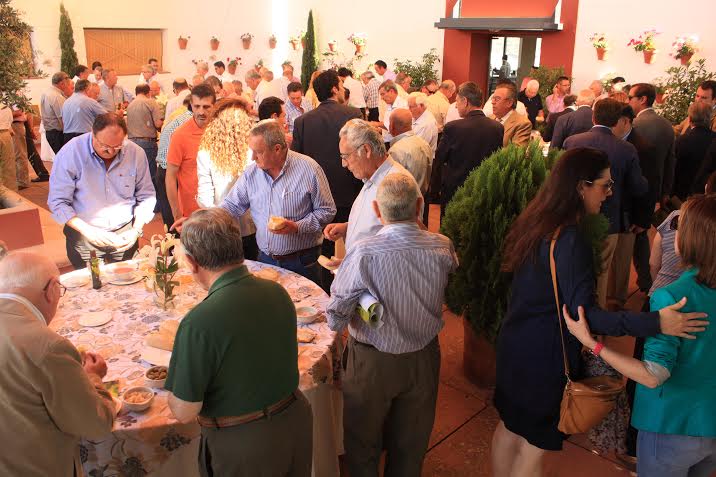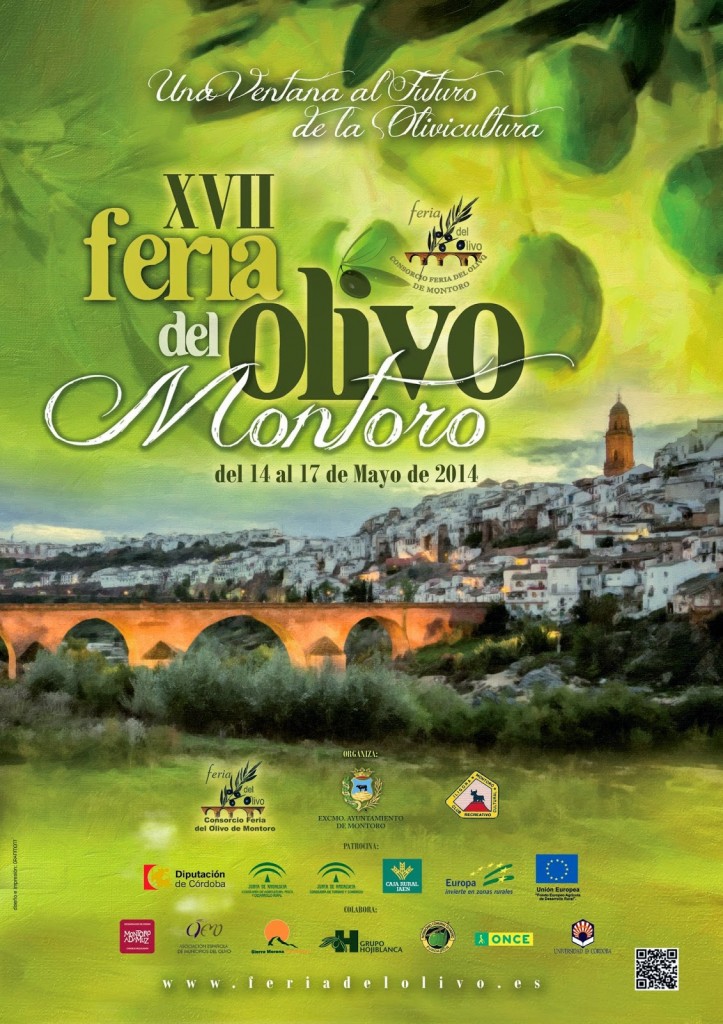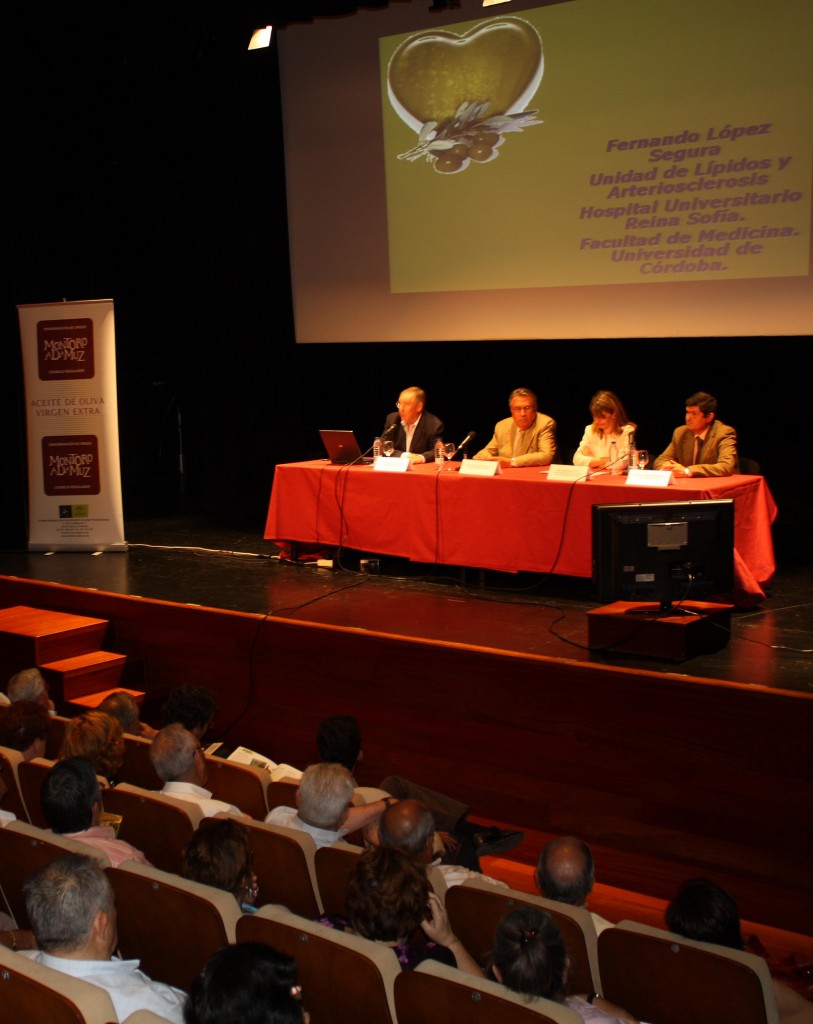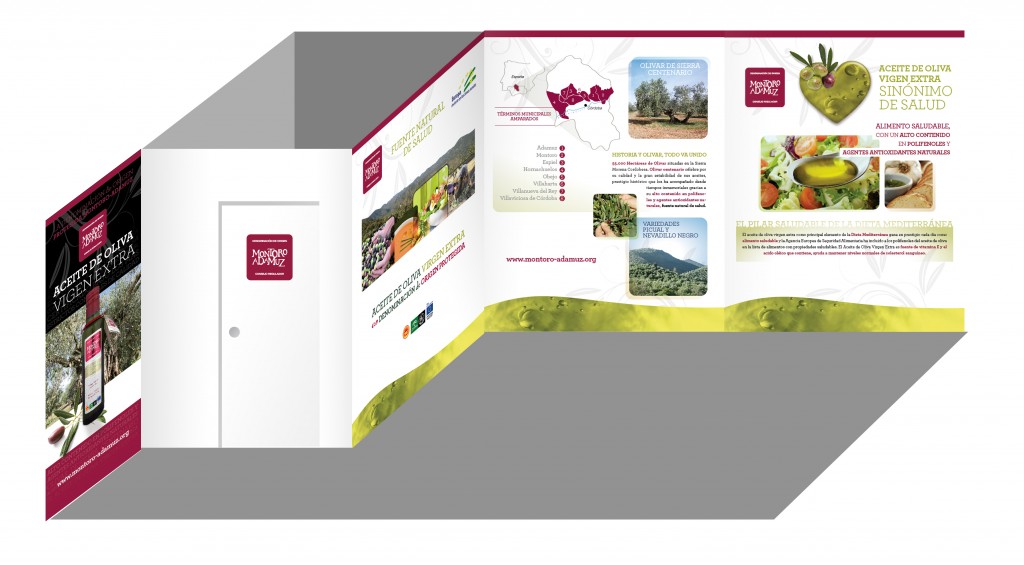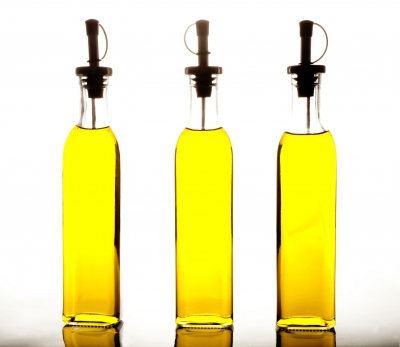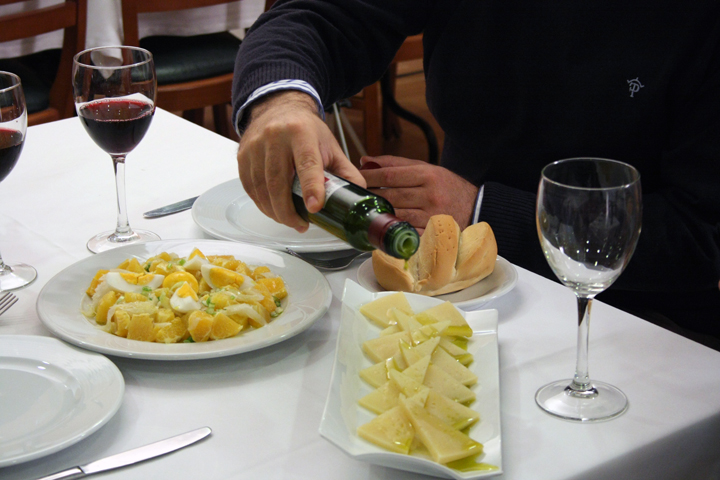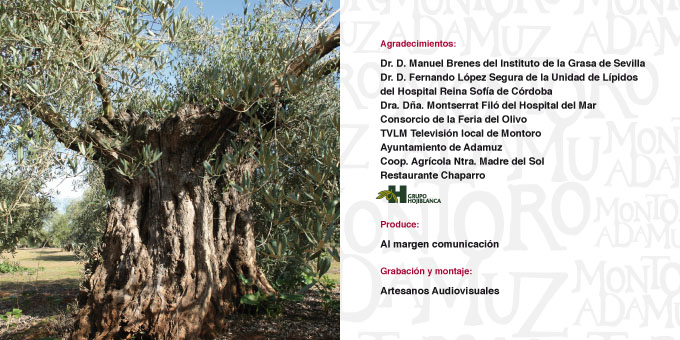Tag Archives: predimed
Video Jornadas Técnicas sobre Aceite y Salud DOP Montoro-Adamuz 2015
El Consejo Regulador de la Denominación de Origen Montoro – Adamuz organiza las “III Jornadas Técnicas sobre Aceite y Salud” que se enmarcan en la Feria del Olivo de Montoro. La DOP Montoro- Adamuz sigue apostando por la producción de aceites de oliva, ricos en polifenoles, actores principales de la dieta mediterránea, que sean referentes en salud y calidad. En este video se reflejan las conclusiones de los ponentes el doctor Ramón Estruch y el doctor Pérez Gimenez y la importancia de los nuevos caminos que abrirá la investigación sobre las propiedades de los polifenoles y la reflexión que tendrá que hacer el sector para producir aceites de oliva más saludables.
El AOVE contra la enfermedad intestinal inflamatoria
Entre los recientes descubrimientos sobre los efectos beneficiosos del AOVE y en concreto de sus principios bioactivos y de los polifenoles en particular tenemos resaltar el efecto sobre los procesos inflamatorios que afectan al tubo digestivo. Entre estas enfermedades podemos destacar la Colitis Ulcerosa y la Enfermedad de Crohn. Ambas desarrollan un proceso inflamatorio crónico que normalmente es tratado con antiinflamatorios y anticuerpos dirigidos contra las citocinas proinflamatorias.
El tratamiento actual no cura la enfermedad de la que se desconoce su origen, actualmente se cree que puede ser desencadenada por la infección de algún virus o bacteria no identificado. Por ello es muy difícil buscar un tratamiento efectivo. En la búsqueda de soluciones eficaces se ha investigado el efecto que la dieta tiene sobre estos pacientes. La mayoría de estos estudios se han realizado sobre animales, y en concreto en la Revista Food & Nutrition trata el tema y la conclusión que se deriva es que la mayoría de los polifenoles inhiben las manifestaciones de estas enfermedades ayudando a regular la inflamación y otros parámetros relacionados con la misma.
Algunos componentes fenólicos del aceite de oliva virgen extra como la oleuropeina, hidroxitirosol o el tirosol han demostrado su eficacia en la inflamación intestinal en ratas mejorando otros parámetros. Otro de los estudios concluye que el AOVE también podría ser beneficioso contra la colitis ulcerosa.
Los aceites de oliva virgen extra ricos en polifenoles son los mas beneficiosos para la salud. Complementar una dieta mediterránea equilibrada, con un aove rico en polifenoles y principios bioactivos es muy recomendable ya que ayuda a prevenir multitud de efermedades. En la Denominación de Origen Protegida Montoro – Adamuz llevamos más de 7 años trabajando en esta línea, produciendo los aceites más ricos en polifenoles y por ende fuente natural de salud.
Fuentes:
http://www.infaoliva.com/documentos/boletines/RESUMEN%20DE%20PRENSA%20%20%2026.5.2015.pdf
http://www.ideal.es/jaen/jaen/201505/25/aove-beneficioso-enfermedad-intestinal-20150524195026.html
http://www.cmed.es/enfermedad-inflamatoria-intestinal.php
http://elpais.com/elpais/2015/05/11/ciencia/1431355310_796945.html
EVOO PDO Montoro-Adamuz – scientifically demonstrated health benefits
The oil from the PDO Montoro-Adamuz is a natural source of health benefits thanks to its high content of bioactive substances.
We have good news about the EVOO from the PDO Montoro-Adamuz!
Research studies demonstrate that “EVOO from PDO Montoro-Adamuz is very beneficial to health”.
Manuel Brenes of the Institute of Fats and Fat Derivatives (IG-CSIC) in Seville gave a presentation at the 28th EFFoST International Conference,heldtogether with the 7th International Food Factory for the Future Conferencewhich took place from 25th to 28th November 2014 at Uppsala Konsert & Kongress (Sweden), under the theme“Innovations in attractive and sustainable food for health”.This has shown, from the studies carried out over the last six seasons, the high content of bioactive compounds in the extra virgin olive oils from the PDO Montoro-Adamuz.
The consumption of extra virgin olive oil is not only highly recommendable for human health due to the high content of fatty acids in its composition, but it is also very beneficial thanks to its content of minor compounds such as phenols, tocopherols, sterols, squalene and others. However, the concentration of these substances in EVOO depends on the type of olives cultivated, the agricultural conditions and the processing methods, among other factors. In this study, thebioactive compounds in EVOO from the PDO Montoro-Adamuz were analysed for various components, in particular phenolic compounds. Similarly, the influence of the location of the olive trees (sunny or shady area) and the content of these substances in the oils were also examined.
The conclusion drawn from this study is thatthe EVOO from the PDO Montoro-Adamuz are very rich in bioactive substances such as oleic acid, sterols, squalene and tocopherols in particular, and they possess a high concentration of phenolic compounds(>700mg/kg)which can be attributed to the extreme agricultural and climatic conditions, the varieties of olive (Picual and Nevadillo Negro) and the early harvesting of the fruit.
This positions the EVOO from the PDO Montoro-Adamuz as the only Protected Designation of Origin whose EVOO has had these components analysed over six years and have scientific evidence of being very healthy.
Oleocanthal, an exciting discovery
The best discoveries sometimes happen due to a coincidence or intuition.
This is the case with the American biologist Gary Beauchamp, discoverer of Oleocanthal, a molecule present in extra virgin olive oil with a strong anti-inflammatory effect.
It turns out that Beauchamp, who gave a speech at the Council of Cordoba on 21st November, invited by the Oleocanthal Society of Andalusia, QVExtra International Association and the Spanish Association of Olive Municipalities, owes this great discovery to chance.
While in Sicily for work he tried the olive oil and detected a flavour similar to that of ibuprofen. This simple perception was the chance start of research that has revealed some extremely surprising data.
The Oleocanthal molecule, present in extra virgin olive oil, has an anti-inflammatory power comparable to that of the non-steroidal inhibitor known as ibuprofen, one of the most widely used drugs worldwide. However, there is one difference between them: Oleocanthal has no side effects for health.
This news is even better if we take into account its role in the prevention of rheumatic illnesses, cardiac disorders, respiratory problems, Alzheimer’s, etc.
However, not all extra virgin olive oils contain the same proportion of Oleocanthal. This depends on many conditioning factors that at first sight seem insignificant in the eyes of non-experts: the quality of the production, the harvesting dates and the types of olive.
In our country, and of course in the PDO Montoro-Adamuz, we can feel very proud as Spain is the main producer of this type of extra virgin olive oil.
Oleocanthal has been added to the long list of health benefits of our oil, something that is demonstrated in the study we carried out in 2008 on the level of polyphenols in our extra virgin olive oils. These have a high content of phenols, much higher than, in some cases three times more than, those in other oils on the market.
(Image from Andreas Levers)
San Andrés Olive Tourism Route
Report in Mercacei
The latest issue of Mercacei Magazine has a special report on the 17th Montoro Olive Tree Trade Fair, in which, as you know, PDO Montoro-Adamuz has a particularly important role.
Over the six pages of this report, the publisher specialising in the olive oil industry gives a detailed description of the characteristics of the mountain olive grove which is characteristic of our PDO, situated in the municipal towns of Montoro, Adamuz, Espiel, Hornachuelos, Obejo, Villaharta, Villanueva del Rey and Villaviciosa de Córdoba.
It highlights our sustainable agricultural practices and traditional harvesting techniques which try, as many of you know, to prevent soil erosion with natural plant cover.
The report also points out the origin of the high polyphenol content of our extra virgin olive oil: “The soil and climatic conditions of the mountain olive groves, situated on acidic, poor and shallow soils, are an exception within the olive groves of southern Spain that, together with the high levels of evapotranspiration and amount of sunshine that provoke stress in the plant, lead to a high content of polyphenols in the oil”. It also adds a mention of the careful cultivation and harvesting of our fruit.
It provides an overview of the health benefits of the high content of polyphenols and antioxidant agents in our extra virgin olive oil; emphasising our work in quality certification.
The report includes an interview with our technical director, Antonio Terán, which you can read below, in which he responds to questions regarding the mountain olive grove and the industry’s prospects.
Without a doubt this report is a big boost to our efforts to promote our extra virgin olive oil, something that is fundamental for our competitiveness in the domestic and international markets.
Mercacei is one of the leading publishing groups with the greatest prestige within the industry, involving notable collaborators and experts from the world of olive oil and winningnumerous international awards for its informative work.
Quality, the key to competitiveness
 Following a short harvest last season we are glad to see the figures showing what we have already handled in this season. Although unconfirmed, the figures already look much more positive than in previous years, as can be seen from the following table.
Following a short harvest last season we are glad to see the figures showing what we have already handled in this season. Although unconfirmed, the figures already look much more positive than in previous years, as can be seen from the following table.
With these figures, we expect oil sales to recover, especially in the export market, and for prices not to fall to the levels that make the business unviable, especially in our quality segment. While quality is the key to competitiveness it leads to high production costs.
Just looking at the five cooperatives from the DCOOP Group, registered in the PDO Montoro-Adamuz (Coop. Agr. Ntra Madre del Sol, Olivarera de Montoro, Coop. Oliv. Ntra. Sra. de la Merced, Olivarera del Guadiato and Coop. del Campo San Antonio Abad) we have figures of more than 80,000 tonnes of olives. This represents more than 200,000 daily wages in the harvest and an income of more than 30 million euros.
Of these figures, around 50% corresponds to the activity of the Coop. Agr. Ntra. Madre del Sol which has also obtained high quality olive fruit of an intense green, highly valued in the market due to their good stability and high content of polyphenols.
All of this has been possible thanks to the improvements made over the last two years in the reception and milling of the olives from our production cooperatives.
The quality of the oil depends not only on the quality of the fruit, but also on caring for it throughout the entire oil production process. Mishandling the olive in the field or in the mill may damage it and lower the category of the oil. Therefore, the farmer and the oil mill are key to the quality of extra virgin olive oil.
At PDO Montoro-Adamuz, therefore, one of our functions is to strengthen the structure of our cooperatives, focusing on the control and improvement of the production quality. However, another of our commitments must be promotion, in order to enhance the value of the product, guaranteeing its origin and quality.
Only with viable and structured companies will we be able to increase the value of our product, which will in turn open the door to export markets (a path that we have already begun to take and that is providing great results).
Long live the Mediterranean diet
Today in our blog we want to highlight the results of two recent pieces of research that have come out of the PREDIMED Study, which we have already spoken about at times.
The reason for choosing these two pieces of research is that both have come to similar conclusions which are very encouraging in terms of human health: a diet rich in polyphenols, such as the Mediterranean diet (based on extra virgin olive oil) contributes to reducing mortality.
The first of these pieces of research is the one that has been coordinated by Doctor Rosa Mª Lamuela, director of the Natural Antioxidants Research Group at the Department of Pharmacy at the University of Barcelona. This has also involved researchers from Rovira i Virgili University (URV).
In this research, which forms part of the doctoral thesis of Ana Trasserra, there has been further analysis of the data provided by the PREDIMED study, which studied people aged between 55 and 80 with cardiovascular risks.
The resulting figures could not have been more positive: this researcher found that the mortality rate (due to cardiovascular diseases or otherwise) of those people who had followed a diet rich in polyphenols was much lower than among the people who had not followed a similar diet.
After her analysis, she also highlighted that certain types of polyphenols were responsible for this reduction in mortality: first we have the stilbenes, present in grape skin and concentrated in red wine; and second we have the lignans found in foods such as olives, sesame and flax seeds and whole grains.
Doctor Lamuela explained that “in other populations studied previously, the consumption of any of the foods rich in polyphenols was not sufficient in itself to reduce mortality, but in our study the consumption of polyphenols was examined more widely, coming from different food sources”. In other words, consuming a variety of types of polyphenols is the key to increasing our life expectancy.
The second study that we want to tell you about focuses specifically on the relationship between the different types of olive oil and the risk of cardiovascular disease, and has been undertaken by the same research groups, although coordinated in this case by Jordi Salas Salvadó, professor at the URV.
This study reveals that if the daily consumption of extra virgin olive oil is increased by 10 grams, mortality due to cardiovascular problems is reduced by 10%. Among the oils, extra virgin olive oil is the best quality due to having a high content of polyphenols, a feature of the oil from the PDO Montoro-Adamuz.
Without a doubt these are two good news stories that once again make us proud of our oil, one of those with the highest content of polyphenols, and make us want to say “Long live the Mediterranean diet!”, as it lengthens our lives.
Course on the Sensory Analysis of Extra Virgin Olive Oil
One of the professional activities carried out in the framework of the 17th Montoro Olive Tree Trade Fair, and one of the most popular this year, was the Course on the Sensory Analysis of Extra Virgin Olive Oil.
A group of 25 students, consisting of millers and experts from the region’s cooperatives, attended this course at the Hotel Mirador in Montoro.
 The first day, 14th May, was led by Brígida Jiménez Herrera, director of theAndalusian Institute of Agricultural and Fisheries Research and Training (IFAPA) in Cabra, who spoke to the participants about the organoleptic properties of extra virgin olive oil. There was then a tasting of international oils and another of the different varieties and blends of oil.
The first day, 14th May, was led by Brígida Jiménez Herrera, director of theAndalusian Institute of Agricultural and Fisheries Research and Training (IFAPA) in Cabra, who spoke to the participants about the organoleptic properties of extra virgin olive oil. There was then a tasting of international oils and another of the different varieties and blends of oil.
The person responsible for running the second day of the tasting course was José María Horcas, head of the laboratory panel at DCOOP. He explained to the participants the features and characteristics of the extra virgin olive oil from the PDO Montoro-Adamuz and the DO Antequera. After his presentation the students took part in a tasting of the olive oils from those designations of origin.
3rd Technical Workshop of the PDO Montoro-Adamuz
With the involvement of more than 200 people, the 3rd Technical Workshop of the PDO Montoro-Adamuz has been one of the highlights of the 17th Montoro Olive Tree Trade Fair (held from 14th to 17th May 2014). In this edition it focused on the values and future of extra virgin olive oil in our designation of origin.
The first presentation in these workshops, dedicated to professionals from the olive industry, was given by the renowned Doctor Ramón Estruch from the University of Barcelona, manager and coordinator of the PREDIMED Study about the effects of the Mediterranean diet on the prevention of cardiovascular diseases. During his presentation he emphasised the conclusions of this study, which show the benefit of consuming extra virgin olive oil, making it clear that “4 or 5 tablespoons per day does not make you gain weight, but rather improves both good and bad cholesterol”.
Moreover, Teresa Pérez Millán, manager of the Interprofesional del Aceite de Oliva organisation, stressed that the level of polyphenols in extra virgin olive oil is what provides its health benefit. In that regard, she highlighted the advantages of the oil from our designation of origin, one of the richest in polyphenols.
Additionally, Pérez Millán noted the need to promote extra virgin olive oil to tourists in order for them to “appreciate our product”, highlighting the different campaigns being carried out by the “Aceites de España” brand throughout the world.
One of the central themes of the technical workshops was undoubtedly the issue surrounding the Common Agricultural Policy (CAP) and mountain olive groves with natural difficulties, a theme that Rafael Sánchez de Puerta, chairman of the EU Olive Oil Advisory Group, addressed in his speech.
Sánchez de Puerta argued that the “CAP must have a better outlook” and said that to achieve this it will be “essential to develop the Rural Development in Andalusia programme”. As he mentioned, this programme will have a budget of 1,900 million and will be managed by the Rural Development Groups (RDG) of Andalusia, who will surely be committed to the mountain olive grove, one of the hardest hit. He continued by saying that “this type of policy, which covers the period between 2014 and 2020, could be implemented from next year”.
During his presentation, Sánchez de Puerta also emphasised the need for the involvement of companies that position our products in the international market. He stressed that two thirds of the olive grove production is already exported across the world, exceeding our main competitor, Italy. In this regard, he focussed on turning farmers into entrepreneurs through cooperatives, in order to strengthen industrialisation, commercialisation and, therefore, the growth of the industry.
In addition to the aforementioned presentations, others were given by renowned researchers and professionals from industries related to extra virgin olive oil, such as Doctor Francisco Pérez Jiménez, from the lipids unit of the Reina Sofía Hospital in Cordoba.
Similarly, during the technical workshops, those who took part were able to enjoy a healthy breakfast based, of course, on extra virgin olive oil.
Summary of the 17th Montoro Olive Tree Trade Fair
Once again this year, Montoro became the epicentre of the olive oil industry thanks to the 17th Olive Tree Trade Fair, which took place from 14th to17th May.
This is a leading event in the industry and this year 140 companies (17 from foreign countries) took part, of which 132 exhibited their products. Among the stands was the one for PDO Montoro-Adamuz, which each day during the event offered those attending a taste of our extra virgin olive oil.
Beyond the exhibition, the 17th Olive Tree Trade Fair brought together oil experts from many different professional activities, allowing them to pool ideas, proposals and figures, generating a more profitable dialogue.
Among the conclusions reached we can highlight the one explained by Antonio Sánchez Villaverde, chairman of the Olive Tree Trade Fair Consortium, who is committed to “a system for the concentration of cooperatives that brings together all the cooperatives from the Alto Guadalquivir district and would be capable of milling 300 million kilogrammes of olives, cutting costs for the farmers, being competitive and making oil profitable”.
In terms of industrial and technological quality and innovation, this was addressed during the opening ceremony by Elena Víboras, Minister of Agriculture, Fishing and Rural Development at the Government of Andalusia, who stated that the intention of this public body is yet again to ask the national Ministry for aid that includes the traditional sloping olive grove, “the key to ensuring the viability of family farms”.
Víboras also pointed out “the olive oil potential of the province of Cordoba, which has the greatest number of Designations of Origin for olive oil in Andalusia: Montoro-Adamuz, Baena, Lucena and Priego de Córdoba”, being the second largest producer of olive oil in Andalusia and Spain.
In addition to other professional activities, such as the Technical Workshops and the Tasting Course, which we will discuss in more depth in later blog posts, the 17th Olive Tree Trade Fair was the setting chosen to reward the work of the professionals in the olive oil industry with different awards.
For example we have the 8th “Pedro León Mellado” Awards for the Quality of Extra Virgin Olive Oils, whose special prize for the Best extra virgin olive oil from the DO Montoro-Adamuz, has gone to the “Nuestra Madre del Sol” Agricultural Cooperative in Adamuz.
In terms of the Diario Córdoba Montoro Olive Tree Trade Fair Awards 2014, the award for Milling Master was won by Nicolás Carrasco Majuelos, that for Innovation and Development by Pieralisisi, that for Business Initiative by Agrocor and the award for Environmental Protection by CBH Agro.
Moreover, López Garrido was named the best Export Company, Vibradores MAI the best Family Business, and Calero the best stand at the fair. It is worth noting that the award for Social Initiative has remained in Montoro, specifically with the Asociación de Comerciantes Épora (Merchants Association of Épora).
17th Montoro Olive Tree Trade Fair
Next week will see a new edition of the Montoro Olive Tree Trade Fair, an essential date in the international olive oil calendar.
From 14th to 17th May 2014, the town of Montoro will yet again become the capital of extra virgin olive oil with the 17th Olive Tree Trade Fair, focusing on promoting the study of the olive grove and the latest technical advances in this industry.
Highlights among a varied programme include two events: the Course on the Sensory Analysis of Extra Virgin Olive Oil and the 3rdTechnical Workshops of the PDO Montoro-Adamuz.
The Course on the Sensory Analysis of Extra Virgin Olive Oil will take place on the 14th and 15th May 2014 in the Hotel Mirador in Montoro, and will focus on the tasting of olive oils from the designations of origin of Montoro-Adamuz and Antequera.
During the first day of this course, which will begin at 4.30pm with a presentation from Antonio Terán, technical director for our designation of origin, Brígida Jiménez Herrera, director of the Andalusian Institute of Agricultural and Fisheries Research and Training (IFAPA) in Cabra, will talk to the attendees about the organoleptic properties of extra virgin olive oil. There will then be a tasting of international oils and another of the different varieties and blends of oil.
On 15th May it will be the turn of José María Horcas, head of the laboratory panel of DCOOP, whose presentation will focus on the quality of olive oil and the elements that influence this. After his presentation there will be a tasting of oils from the season from Montoro-Adamuz and Antequera.
On that same day, in the Miguel Romero Esteo Municipal Theatre, the 3rd Technical Workshops of the PDO Montoro-Adamuz will start. This edition will focus on the values and future of extra virgin olive oil in our designation of origin.
Those responsible for opening this event, which begins at 9am, areAntonio Sánchez Villaverde, Mayor of Montoro; Francisco Terán Blanco, Chairman of the Governing Board of the PDO Montoro-Adamuz; and Ana María Romero Obrero, Director General of Quality, Agro-food Industries and Ecological Production at the Ministry of Agriculture, Fishing and Rural Development at the Government of Andalusia.
At 9.30am, Doctor Ramón Estruch will present the PREDIMED study titled “Effects of the Mediterranean Diet on the first prevention of cardiovascular disease”, which we recently told you about in this blog.
This presentation will be followed by a round table session “Benefits of olive oil and its polyphenols on health”, which will involve, in addition to Doctor Estruch, Teresa Pérez Millán, manager of the Interprofesional del Aceite de Oliva organisation, and Doctor Francisco Pérez Jiménez, from the lipids unit at the Reina Sofía Hospital in Cordoba.
To recharge the batteries so that we can continue with these intensive days, there is nothing better than a miller’s breakfast including, of course, its olive oil.
After the break it will be the turn of the Chairman of our Governing Board, Francisco Terán Blanco, who will talk to us about the “Present and future of extra virgin olive oil from the PDO Montoro-Adamuz”.
At 12 noon the presentationtitled“The CAP from here to 2020, the mountain olive grove with natural difficulties” will be given by Rafael Sánchez Puerta, Chairman of the EU Olive Oil Advisory Group and Juan Carlos Vega Chacón, coordinator of the subsidies service at DCOOP.
The last session will be titled“New regulation for the sustainable use of plant protection products. Compulsory integrated pest management and the farm register”. Those responsible for giving this will be Pablo Soto Hermoso, Head of Service of the Provincial Delegation of Cordoba of the Ministry of Agriculture, Fishing and Rural Development at the Government of Andalusia; and Francisco Javier Merino Sierra, Director of the District Agricultural Office of Montoro at the same Ministry.
To complete our workshop we will count on the presence of Francisco Zurera Aragón, representative of Agriculture, Fishing and Rural Development at the Government of Andalusia.
However, the 17th Montoro Olive Tree Trade Fair does not end there. Over the days there will be a large number of exhibitions, contests and competitions, all to enhance the value of the cultivation of the olive grove, essential in understanding the history, economic development and day to day life of the town of Montoro, the jewel of the Alto Guadalquivir in Cordoba.
You can find the complete programme for the fair and register on its website: www.feriadelolivo.es
Extra virgin olive oil: a great ally against diabetes
Sometime ago we told you in our blog about the study conducted by the Department of Endocrinology and Nutrition at the Carlos Haya Hospital in Malaga on the role of fat in the diet. This demonstrated, among other noteworthy results, that extra virgin olive oil from the PDO Montoro-Adamuz increased sensitivity to insulin.
Today we want to delve a little deeper into the relationship between extra virgin olive oil and the prevention of certain diseases, such as diabetes.
A new result from the PREDIMED Study (Prevention with Mediterranean Diet) has recently been published in the Annals of Internal Medicine journal, which shows that the Mediterranean diet, supplemented with extra virgin olive oil, reduces the risk of developing diabetes.
The research involved 7,447 people, of whom 3,541 did not suffer from diabetes mellitus at the time of their participation. During the almost five years for which the study lasted, they were subjected to annual analyses to check what percentage began to suffer from this disease when following a Mediterranean diet supplemented with extra virgin olive oil and the results could not have been better: extra virgin olive oil reduces the risk of developing diabetes by 40%.
The coordinator of this study, Doctor Ramón Estruch, acknowledges that, although positive results were expected, the great power of extra virgin olive oil to prevent cardiovascular diseases, in this case diabetes, has been a complete surprise.
So much so that a new study, the PREDIMED Plus, has already been planned, through which the possible beneficial effects of extra virgin olive oil in treating people who are obese and overweight will be looked at in more depth.
If the result is positive it would finally banish the idea that extra virgin olive oil “makes people gain weight”, as is commonly thought. According to Doctor Estruch, the aim is to “demonstrate that a well-balanced diet, which includes extra virgin olive oil, can help people to lose weight and partially prevent the appearance of complications such as heart attacks or strokes”.
He also aims to conduct another study to determine whether following the Mediterranean diet supplemented with extra virgin olive oil can also contribute to preventing the appearance of certain types of cancer.
With figures as positive as these, we cannot be prouder of contributing to the promotion of such a healthy food as the extra virgin olive oil from the PDO Montoro-Adamuz.
4th Edition of the “Botijuela”
Miller’s breakfast on Andalusia Day: a very healthy tradition
Designation Montoro-Adamuz exports EVOO to China
The first bottles from the PDO Montoro-Adamuz destined for the Asian country are being packaged at the facilities of the Hojiblanca Group in Villarubia (Cordoba). Around 100,000 kg of Extra Virgin Olive Oilof the OLIO brand will be packaged throughout 2013, the first steps towards the exporting that we hope to see consolidated over time.
Olive oil, as the main element of the Mediterranean Diet, is gaining prestige every day as a healthy food and is conquering new markets thanks to publications such as the PREDIMED study, the trial with the greatest scope and conducted on nutrition in Spain over a period of 10 years. It has had a big impact in the media worldwide and concludes that a Mediterranean Diet enriched with extra virgin olive oil reduces the risk of suffering from cardiovascular diseases by 30%.
Thanks to the research conducted by the Protected Designation of Origin Montoro-Adamuz over the last five seasons, it has been possible to demonstrate the high content of natural polyphenols in its oils. This makes them very healthy and stable, which is helping to open new markets outside Spain. Product promotion is going to begin in countries such as the United States and Japan, both very health conscious, and we hope to have some more good news soon.
This is recognition of the good work of the farmers and cooperatives in the district. Each year they strive to improve the quality of their production and, with the help of the PDO Montoro-Adamuz, intend to promote the virtues of the oil, for the expansion of their markets and to help them increase the competitiveness of the mountain olive groves of Montoro-Adamuz.
The team from the PREDIMED Study publishes new results
The team from the PREDIMED Study publishes new results in the Journal of Neurology, Neurosurgery and Psychiatry.
The consumption of a Mediterranean diet enriched with extra virgin olive oil helps to prevent mental decline in old age
- The research, led by the University of Navarre, has been developed over the last six and a half years and 552 people aged between 55 and 80 years have participated.
- The study, which began in 2003, has involved the collaboration of the Communal Olive Grower Heritage Foundation (Fundación Patrimonio Comunal Olivarero), which has provided the extra virgin oils used in the diet of the people taking part in the study
Madrid 21-05-2013. The PREDIMED Study (Prevention with Mediterranean Diet) is a true gold mine for Spanish science. It has already shown that the consumption of a Mediterranean diet rich in olive oils or nuts prevents cardiovascular diseases and now it is time to look at its effects on mental health in old age.
The Journal of Neurology, Neurosurgery and Psychiatry has published an article which analyses the results in this new area of research using PREDIMED, led in this case by the University of Navarre in collaboration with Primary Care centres from the Navarre Health Service. It has assessed the effects of this diet on the mental capacity of a selected group of participants in the PREDIMED Study. The team, led by Professor Miguel Ángel Martínez, has worked with a sample of 522 people from the Autonomous Community of Navarre who have been monitored over six and a half years. The participants in the study, aged between 55 and 80, were randomly assigned to three groups. The first was given a Mediterranean diet rich in extra virgin olive oil. The second was given a Mediterranean diet complemented with nuts, while the control group, the third, was given a diet low in fats, of the type usually prescribed to people at risk from a cardiovascular disease.
 Miguel Ángel Martínez, Professor of Preventative Medicine and Public Health at the University of Navarre
Miguel Ángel Martínez, Professor of Preventative Medicine and Public Health at the University of Navarre
“What has happened over the six and a half years of monitoring? Well, cognitive functioning, cognitive performance that is assessed with some standardised tests (Mini-mental Test and Clock Drawing Test), were significantly better in the two Mediterranean diet groups, especially in the group with the Mediterranean diet with extra virgin olive oil, if we compare it with the group of people who have followed a low-fat diet”. Doctor Martínez explains that cognitive impairment is measured with tests designed to determine the capacity for memorising, orientation or the ability to calculate, fundamentally in older people.
This data must still be completed, in such a way that “in the coming months we will probably have information on how many participants have developed Alzheimer’s disease and how many dementia, and it is foreseeable that we will have very solid proof that Alzheimer’s disease can be prevented with extra virgin olive oil and the Mediterranean diet”.
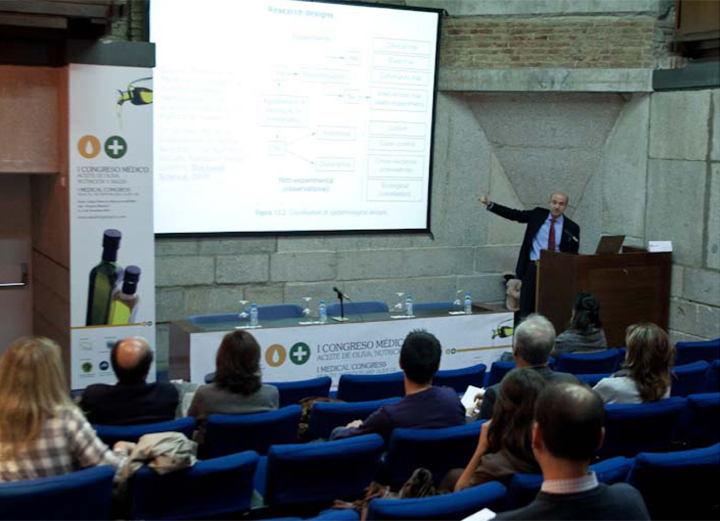 Doctor Martínez during the presentation given at the 1st Medical Conference Olive Oil, Nutrition and Health organised by the Interprofesional del Aceite de Oliva organisation
Doctor Martínez during the presentation given at the 1st Medical Conference Olive Oil, Nutrition and Health organised by the Interprofesional del Aceite de Oliva organisation
It is clear that this data merely confirms the results from many research projects that have spent years working on the effects of olive oil on health. “It has been shown that extra virgin olive oil contains a molecule, oleocanthal, which produces a beneficial effect on the cerebral beta-amyloid, promoting its elimination. A lot of beta-amyloid accumulates in the brains of patients with Alzheimer’s. So, when a person consumes extra virgin olive oil, that molecule, the oleocanthal, removes the beta-amyloid from the brain, and this is a mechanism, among others, through which it could have the beneficial effect now found in this trial”.
Source: Interprofesional del Aceite de Oliva Español
For more information: www.interprofesionaldelaceitedeoliva.com
Extra virgin olive oil in non-refillable packaging will be compulsory in the hospitality industry
Non-refillable packaging in the hospitality industry will benefit the production of high quality olive oil.
This initiative is very important as it will fundamentally benefit those producers and packagers committed to quality. In fact, with all the packaging correctly labelled the consumer will have more opportunity to compare some brands with others and, in such comparisons, the best value for money will always come out the winner.
The requirement for oil packaging to be labelled and non-refillable is very important in terms of protecting the image of this product, as the anonymous oil dispensers used today in many hospitality establishments are not suitable for continuous use and re-filling, which harms the olive oil. This regulatory change is going to help extra virgin olive oil to achieve a prestige similar to that already achieved by wine, as the hospitality industry is going to influence the consumption of this product. The consumers will discover different brands and types of olive oil through consuming them in restaurants or hotels and if the product they have tasted is to their liking they will then consume it at home.
Additionally, this regulatory change will encourage bar and restaurant owners to offer different extra virgin olive oils for breakfast, salads or starters, which will increase the advisory role of the Horeca sector. Moreover, the fact that the oil is going to be supplied in single-use containers does not mean that the final bill paid by the customer in a hospitality establishment will be larger, as oil represents a very small percentage of costs for the owner.
PDO Montoro-Adamuz Oil and Health Video
We have recently made a corporate video entitled “PDO Montoro-Adamuz oil, Source of Health”.Benefits of Extra Virgin Olive Oil and its Polyphenols. We have included a short introduction about the extra virgin olive oils from the PDO Montoro-Adamuz with some beautiful images of the area’s mountain olive groves and the mission of the Governing Board. It includes the conclusions from the Workshops on Oil and Health from the PDO Montoro-Adamuz, where Doctor Manuel Brenes from the Institute of Fats and Fat Derivatives, Doctor Fernando López Segura from the lipids unit at the Reina Sofía Hospital and Doctor Montserrat Fito from the Hospital del Mar in Barcelona discuss the conclusions from their respective work. We offer you a link so that you can enjoy it.
https://www.youtube.com/watch?v=Ly-pUDBNK8M



